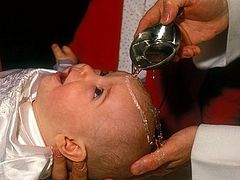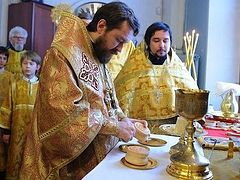November 25, 2014
A dozen words will reverberate across the Christian world causing tears of joy or anguish depending on how you feel about women holding senior offices in church. Last week, Canon 33 of the General Synod, the governing organ of the Church of England, reads "A man or woman may be consecrated to the office of bishop." The decision came after a vote by the General Synod in London over an issue that the church has debated for almost 40 years. The new bishops may be appointed as early as this Christmas.
Bishop of Shrewsbury, the Right Reverend Mark Rylands, told Shropshire Star that changing the law was "good news" and the church stood to gain from the expanded pool of leaders.
"The Church of England will benefit greatly from female leadership and there are plenty of able women ready and waiting to become bishops," he told the publication. "This is good news for England as well as our Church."
Welcoming the decision too, was Hilary Cotton the chair of Women and the Church, a group that campaigns for the inclusion of men and women at all leadership ranks of the Church of England. On their Website, the organization said there was a "deep and rich pool" from which the church could draw for female leaders so that it could become "a place of flourishing for both men and women."
"Today signals a profound shift in the Church of England, and for Anglicans around the world," Cotton said to her group. "Women and men will at last be able to use their gifts fully in the leadership of the Church. WATCH looks forward to bringing gender justice to fruition in the Church of England. From now, we are just getting started."
Female leadership in the church has remained a contentious issue across many denominations and customarily women have been prohibited from holding some of the higher offices.
"Christ's apostles were men," Tracy Sukraw, the director of communications at the Episcopal Diocese of Massachusetts, the first Episcopal diocese to be led by a woman, told The Christian Post. "That is the traditional argument made for a male-only priesthood and episcopacy."
Reform, a group within the Church of England that remains opposed to the idea of female bishops, said in a statement that while men and women are equal in God's eyes, they have different roles in life. The group reiterates the responsibility of leading and teaching rests solely on the shoulders of men and adds that at least a quarter of the congregation will disagree with the new role of women in the curch. Rod Thomas, speaking for the group said that men solely leading the congregation does not demean or devalue women and that they would "strive to teach and model in the lives of these great truths"
"Male headship no more demeans women than it demeans Christ under the headship of his Father – which is clearly impossible in the perfect love of the Trinity," he said in a statement back in July when the initial vote of the General Synod became public. "So from God's first purposes in creation to his ultimate salvation, headship and submission are taught and modelled."
Archbishop Welby acknowledged that not all laity and clergy will embrace the decision of the synod and that this difference of opinion could lead to a cleft in the church.
"Without prayer and repentance, it is hard to see how we can avoid some serious fractures," he said.
Some churches in the Anglican Communion, of which the Church of England is a member, have ordained women for more than 25 years. The Episcopal Church, another member of the global Anglican Communion, first ordained a woman bishop in 1989 when Barbara Harris was ordained suffragan bishop of Massachusetts. A suffragan bishop does not traditionally have a home cathedral.
Earlier in August, Right Reverend Gayle E. Harris, the current Bishop Suffragan of the Episcopal Diocese of Massachusetts, became the first female Anglican bishop to preach in a Welsh cathedral. Bishop Harris said women serving in the Anglican Church are "natural and appropriate."
"The church is not just enriched by women's ordination, it's more enabled and empowered by women's presence," she told Episcopal News Service during a telephone interview from the U.K. as she prepared for her historic participation at Saint Asaph Cathedral in North Wales. "I see women bringing to the fore the desire that all people sit at the table of leadership, that all share in the benefits of the life of God. Nobody should be ignored or left out."
The synod agreed to allow congregations a choice on whether they would rather have a male or female bishop. The Church of England last voted on the issue in 2012, when the decision to allow women to serve as bishops was defeated by six votes. In main stream Christianity, the Roman Catholic Church and The Orthodox Church are some of the traditions that do not allow women to hold senior offices.





